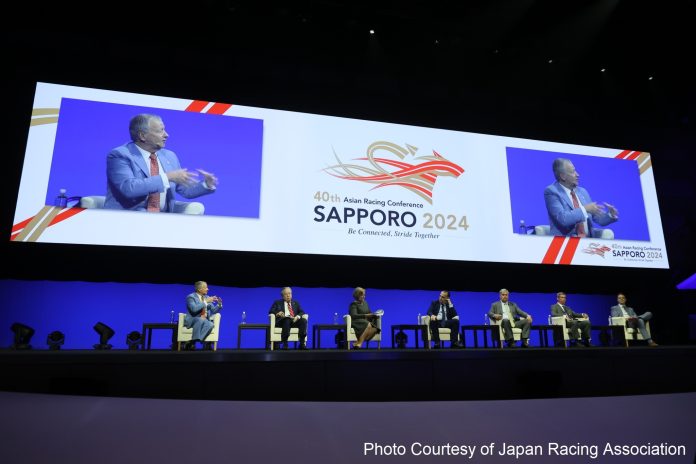
Asian Racing Federation (ARF) Chairman and Hong Kong Jockey Club Chief Executive Officer, Mr Winfried Engelbrecht-Bresges, has identified four key issues horse racing must overcome to realise its full potential.
Opening the 40th Asian Racing Conference’s (ARC) first session with a presentation titled ‘Racing: State Of Play’ on Wednesday (28 August), Mr Engelbrecht-Bresges urged the sport to collaborate globally to address its most pressing challenges.
“The first aspect is industry fragmentation, the second is social acceptability, third is the growth of illegal and offshore betting, and number four is the long-term sustainability of our sport, which is at risk due to an ageing customer base,” Mr Engelbrecht-Bresges said.
“There has been a significant change after COVID when you look at consumer behaviours and if you look at the industry, and topics like social acceptability, and when I look at the ARF itself, we have excelled after coming out of COVID but our challenges are significant.
“If we want to manage these challenges and come up with good strategies, it is not one single jurisdiction who can do this. We, as a sport, must work much closer together really stride together.
“We have to evolve globally. There are differing priorities locally, but we have to think globally, and especially when it comes to having the necessary protections to keep our social licence – there is definitely a challenge of how we as an industry are viewed widely by people who are not in racing.”
Mr Engelbrecht-Bresges believes racing’s growth is threatened by industry fragmentation, urging horse racing to adopt a joint approach to overcoming obstacles – a sentiment which is reflected in 40th ARC’s theme: “Be Connected, Stride Together”.
He said racing was at a ‘critical juncture,’ calling on key personnel to satisfy the public’s needs in the face of generational change.
Mr Engelbrecht-Bresges wants to prioritise science, technology and research to increase safety for horses, hoping to bring together the best minds to come up with solutions and innovations, especially via the use of AI (artificial intelligence).
The conference heard the global illegal wagering market is worth an estimated US$1.7 trillion and is growing at a faster rate than the legal market and poses a significant risk to horse racing’s viability.
After his keynote presentation, Mr Engelbrecht-Bresges was joined on a panel by Mr Masayuki Goto, Vice Chairman of the ARF and Executive Advisor, Japan Racing Association (JRA); Mr Peter V’landys, Chief Executive Officer of Racing New South Wales; Mr Aaron Morrison, Chief Executive Officer of Racing Victoria; Suzanne Eade, Chief Executive Officer of Horse Racing Ireland; Mr Drew Fleming, President and Chief Executive Officer of the Breeders’ Cup; and Mr Joe Saumarez Smith, Chair, British Horseracing Authority.
Acknowledging the rapid growth and success of World Pool as a key funding tool, Mr V’landys echoed Mr Engelbrecht-Bresges’ view that increased collaboration can help the industry to flourish, citing the benefits of World Pool.
Mr V’Landys said: “I think (the World Pool) has the potential to save world racing because it really highlights the major events in every country, it puts the focus on that event and punters from all around the world can bet on that particular race.”
Chairing a session titled ‘Fans: Give Them What They Want’, Mr Andrew Harding, Secretary General, Asian Racing Federation and Hong Kong Jockey Club Executive Director, Racing said fan engagement would determine the sport’s future.
“Do we maintain our position and grow, or do we become increasingly marginalised to the point of irrelevance?” Mr Harding asked.
Mr Harding said memories of standing in an almost deserted Sha Tin grandstand during the COVID pandemic while watching the 2020 LONGINES Hong Kong International Races remain vivid and served as a reminder of the importance of fans.
“Standing there at Sha Tin was a surreal experience. A handful of people, 271 in a grandstand that holds 80,000,” Mr Harding said.
“What struck me was the eerie silence. It reinforced the self-evident that the fans are first and foremost customers and the fans are never mere spectators. They are truly an essential part of the event itself.
“Fan engagement is not a mere buzzword. It will determine our future. It will determine whether we maintain, hopefully grow or become increasingly marginalised to the point of irrelevance.”
Mr Harding said the digital age has also revolutionised the way that fans connect with sport and digital connection allows for a two-way relationship in which fans can feel heard and valued.
Mr Dennis Hau, Hong Kong Jockey Club Executive Director, Customer Strategy, Insights and Innovation told the Conference: “The next generation of our customers will definitely want to have more digital solutions, including the AI (Artificial Intelligence) generated race cards, potentially an AI simulator to predict which horse is going to win and we might also introduce VR and AR (Virtual Reality, Augmented Reality) race-watching experiences.
“The dream that I am trying to achieve is to create the ChatGPT version of horse racing. It will have data from the back-end to support it to become the best specialist for you to predict the race ahead.”
The ARC continues on Thursday (29 August) with sessions on wagering innovation, new-age integrity threats, Japanese racing and breeding and changes across the ARF.



